The outdoorsman, conservationist, and writer is helping the masses understand our ancestral roots in hunting and fishing for food.
Steve Rinella thinks about meat a lot. And not just for his role as host and star of MeatEater, a combination reality show on Netflix that blurs the lines between hunting, outdoorsmanship, and delicious cooking.
A typical episode of MeatEater follows Rinella and his crew hunting somewhere exotic, meeting a local expert, then cooking up a delicious meal—everything from turkeys in Florida to doll sheep in Alaska. Watching the show, which is entirely devoid of manufactured drama, the hunting trips feel more like philosophical experiences.
MeatEater often broaches subjects far afield from simply stalking game. It might include historical and current conservation practices, indigenous cultures’ approach to livestock and food management, and the valuable lessons learned from a life spent outdoors. On a recent trip to Montana, I visited Rinella to learn how reality show hunting translates to a meat eater’s lifestyle in the real world.

Courtesy Image
Wild Meat Only
Cooking shows can often seem torturous to a semi-starving cyclist like myself in a near-constant state of hypoglycemia. Naturally hungry at the outset of our interview, I ask Rinella whether he truly lives up to his quote in MeatEater’s intro montage: “I live to hunt, and hunt to live.”
“We only eat wild meat in our house,” Rinella tells me. “For all the other stuff—oil, vegetables, seasonings—we get it from grocery stores, but I'm real strict about the fish and game.”
Rinella and his family eat a sit-down dinner every night, when possible, and also grow vegetables during the short season when Montana weather allows. But even when shopping for groceries at the store, he always keeps things simple.
“When I serve dinner, everything looks like it grew out of the ground or was removed from an animal," he says. "It just looks like what it is, y'know? That looks like asparagus. That looks like a potato. That looks like some kind of meat cut out of an animal.”
In a modern food culture engorged on processed grub, Rinella's dietary approach clearly stands out—and also strays from the myriad food fads making rounds online today.
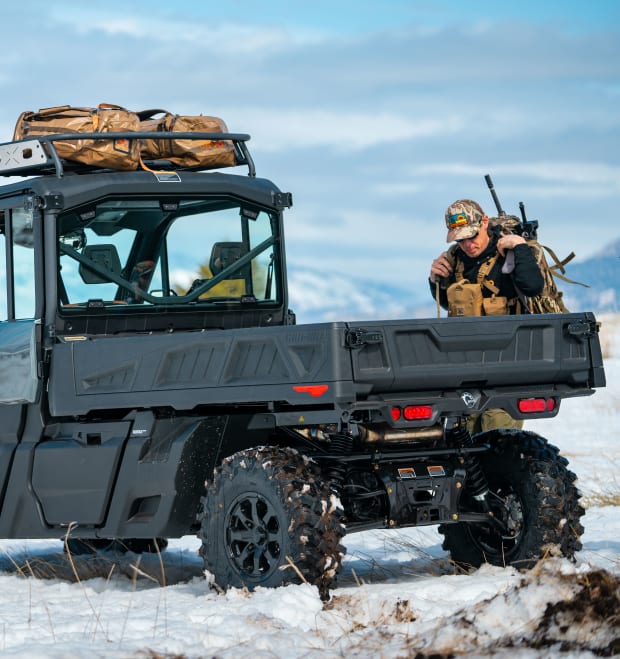
Courtesy Image
Hunting as a Lifestyle
“I always wanted to have a job in the outdoors,” says Rinella, when I ask him how a decade of MeatEater has changed his views on hunting as a lifestyle. “I started trapping muskrats when I was 10, kept trapping fur until I was in my third year of college, and that's what I was gonna do for a living. My backup plan was to be an outdoor writer."
Sharing with him how much I enjoy cooking, I mention I avoided a career as a chef because I didn’t want it to start feeling like a job. Not so for Rinella. Even 120 episodes later, he still doesn’t think of hunting as work.
“I go hunting and I end up having experiences I use to make my work,” he explains, “But I don't think of my hunting as my work. I view the work I do as being the stuff you do at a desk.”
Rinella’s diet includes far more wild meat than mine. When I mention my greater focus on vegetables, there's no condescension or judgment. He has no qualms about those who might disagree with his views or be averse to hunting for any number of reasons. As a public figure in the hunting community, with a platform on Netflix and multiple books published, Rinella does take his status as role model and thought leader seriously, though.
“The most important thing to me is to communicate with hunters, anglers, and outdoors people and help them make sense of this world we love," he says. "The other part of my job is talking to people who are looking very much from the outside in.”
To reach those holdouts or explain a different world view to the anti-hunting crowd, Rinella often uses a simple metaphor.
“If you're a hunter, you might look at a wildlife habitat as being like an apple tree and wildlife as being the apples," he says. "Preserving the integrity of the tree so that it produces apples is very important. Now, some people might say, ‘But I feel great empathy and pity for that apple.’ And to that I say—that apple will fall to the ground and it will die and decay, but it will be replaced by more apples.”
For Rinella and many hunters, the apple is ephemeral. It’s a function of the tree. Caring for the apple (wildlife) thus requires a focus on issues that affect the tree (wildlife habitat).
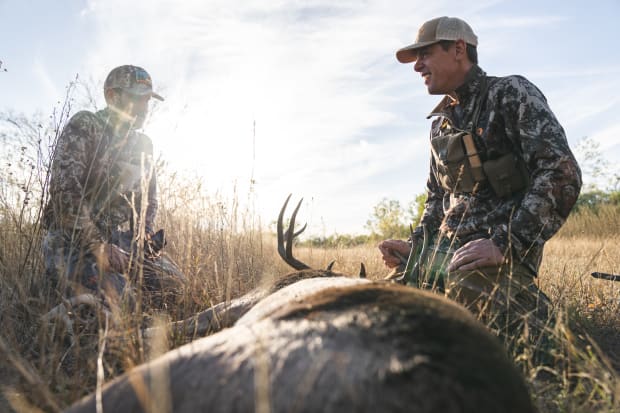
Courtesy Image
An Outdoor Education
“I was hugely influenced by how I was brought up,” says Rinella, who openly recognizes how his own childhood experiences have shaped his life and livelihood. “I don't remember beginning hunting. I don't remember beginning fishing. It's just something I've always done.”
If forced to make the choice, this meat eater would duck into the more welcoming community of hunters and leave the public debate to others. As a spokesperson of sorts for this lifestyle, he believes in the value of constructive conversation.
“I'm comfortable and confident enough in my views that I don't feel threatened by someone who doesn't align with them because they were shaped by a completely different set of experiences," he says. "When encountering people with different views, I find it's always more rewarding to have an open dialogue.”
Of course, in today’s increasingly digital world, online arguments often bubble over far past the limits of rational dialogue. Rinella has zero interest in duking it out in the comments section.
“What I do ask of people is that even if you have no desire to participate, there's a thing or two I'd like you to know. I think it's important to explain the great history we have of hunters and anglers doing so much to preserve habitats for wildlife, and really being one of the leading influences on habitat conservation in this country.”
Back we go to the apple tree metaphor. If extended, it also suggests that appleseeds then sprout into new trees, as hunting regulations, tags, and bag limits help more animals live in wider numbers. Global population growth means that not everyone can hunt to live, so even if Rinella wanted to convert the whole world to his lifestyle (which he doesn't), the simple math wouldn’t work.
“If everyone in America went out and killed a deer right now,” he says, “We'd have a 200 million deer deficit. We’d be 200 million deer in the hole.”
Overall, Rinella's take on how different viewpoints arise from different life stories feels like a breath of fresh air—lending a vibe of positivity and inclusion that made Ted Lasso such a standout TV series in an increasingly divisive era.
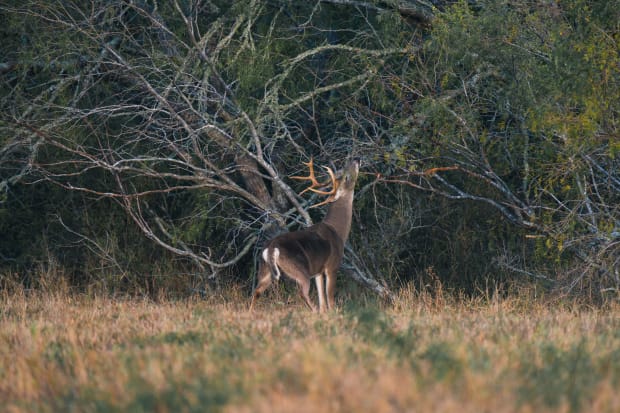
Courtesy Image
Rinella’s 'Desert Island' Food
“I could live off mule deer," muses Rinella, when I pull out the inevitable desert island question. "I could live off venison, no problem. Once I got past coffee, I wouldn't care. I always like to point out that I'd want to be able to eat the whole animal," he adds, after a slight pause. "All the internal organs and tongue and all that because I feel like you'd have to diversify beyond just the red meat.”
Rinella grew up hunting and recognizes that a sporting, trophy nature exists in this community. His home is filled with pelts and taxidermied animals, but shooting sports generally leave him uninterested. He’ll shoot at the range with rifles and bows to prepare for hunts, but he’s more about the activity of stalking and eating, rather than shooting simply for the sake of shooting.
“I like to hunt and fish for the things I like to consume," he states. "If you took the food aspect out of it, it wouldn't be nearly as compelling to me. There's also a social dynamic to it that I like—being with friends out in the woods. I like the sense of self-sufficiency, which is food-based but also physical-based. I like to raise my kids around it, 'cause I like them to have a raw edge to 'em. I enjoy the whole educational function of it, meaning how much you learn about resources and wildlife.”
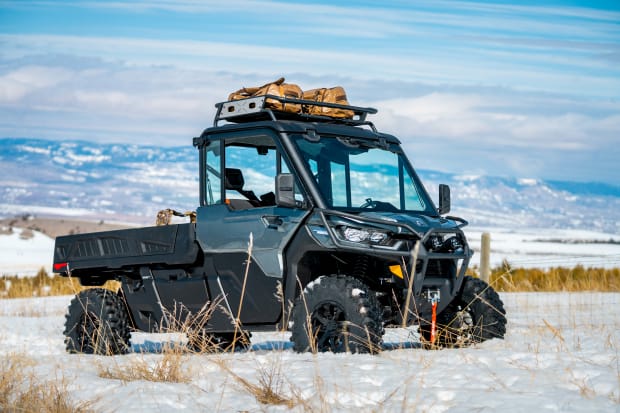
Courtesy Image
The MeatEater Can-Am Defender
Part of that education means traveling to remote reaches of nature that most humans will never visit. Outside his house, Rinella walks me around his new hunting rig, a Can-Am Defender Pro Limited decked out for any adventure. He selected the bigger 72-inch bed equipped with the hydraulic power tilt system for loading, hauling, and unloading carcasses. Up top, a roof rack holds gear and doubles as a platform for camp chairs during stakeouts. And the enclosed cabin with heating and air conditioning allows for all-season, all-weather use. The windshield even flips up for better “glassing” (hunting vernacular for using binoculars to look for game), plus skid plates, and a 4,500-pound winch—just in case.
The Defender is no dune-charging side-by-side, but rather a UTV that’s legal to drive on public roads in Montana with mirrors and turn signals. And at just 65-inches wide, it can go places off-road that trucks and SUVs can’t.
“Before I had a Can-Am, we did everything out of a personal vehicle,” says Rinella. “You're wearing and tearing your vehicle, which goes a fraction of the speed and doesn't fit in all the places.
"When we hunt down in the deserts in Mexico, the number one thing is just being able to get around,” he says. “We've tried to do it out of rental vehicles, which is just impossible. Then we discovered bringing a Can-Am down there, and we'd go places we could never get to and get there way quicker. Makes a huge difference.”
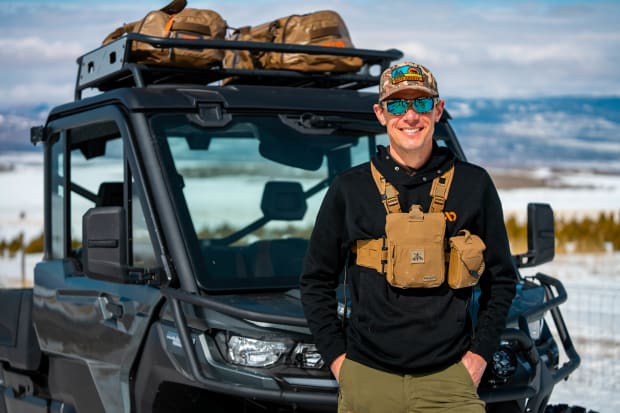
Courtesy Image
Staying Fit for the Hunting Life
Rinella’s hunting lifestyle has regularly placed him in dangerous situations. The closest he remembers coming to punching his ticket involved hitting a submerged log in a skiff and taking on frigid water in Alaska. There have been some dicey encounters with wildlife too.
“I've had run-ins with bears,” he says. “I think there's this sort of vestigial distrust we carry of large animals that's been ingrained in us. The same way people have natural fears of snakes and spiders. It's not pertinent to them anymore, but once upon a time, for some ancestor, it was a real thing.”
Backpacking up mountains in search of deer or spearfishing in the breakwater reefs of Hawai’i both require serious conditioning, which Rinella, 49, readily recognizes now.
“I didn't get serious about working out until I was probably 40 years old, to be honest with you," he says. "The kind of stuff I do, hiking, carrying weight, all that sort of thing, you can kind of build up a tolerance for it to a point."
Now, he focuses on keeping on a bit of muscle mass, both through diet and weight lifting, to make sure long periods of exertion don’t leave him depleted.
“A couple years ago, I was sheep hunting and tweaked my shoulder and that hurt for eight months,” he recalls. “That stuff would've never happened in the past. So a big motivation of working out for me is just trying to build up more resilience and keep at it longer.”
Next up, Rinella looks forward to hunting turkeys for most of the spring, with a little spearfishing thrown in to tide him over until Montana bear season begins—likely delayed due to the extreme winter. He’ll spend the summer helping his daughter prepare for her first big-game season too.
Expect to catch a look at his new Can-Am in the next season of MeatEater. In the meantime, Rinella's third children’s book, Catch a Crayfish, Count the Stars, comes out in June, chock full of projects, skills, and adventures to get kids off screens and and deep into the great outdoors.
from Men's Journal https://ift.tt/4Em2Cbi


0 comments